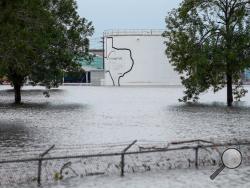DALLAS (AP) — A flooded chemical plant in a small town outside of Houston is poised to explode, a spokeswoman for the French company that owns the plant says, though the timing and the extent of the danger are not clear.
The Arkema Inc. plant in Crosby, Texas, about 25 miles (40 kilometers) northeast of Houston, lost power and its backup generators amid Harvey's dayslong deluge, leaving it without refrigeration for chemicals that become volatile as the temperature rises.
"The fire will happen. It will resemble a gasoline fire. It will be explosive and intense in nature," spokeswoman Janet Smith told The Associated Press late Wednesday.
There was "no way to prevent" the explosion, chief executive Rich Rowe said earlier Wednesday.
Arkema manufactures organic peroxides, a family of compounds used for making everything from pharmaceuticals to construction materials.
"As the temperature rises, the natural state of these materials will decompose. A white smoke will result, and that will catch fire," Smith said. "So the fire is imminent. The question is when."
The company shut down the Crosby site before Harvey made landfall last week, but a crew of 11 had stayed behind. That group was removed and residents within 1.5 miles (2.4 kilometers) were told to evacuate Tuesday after the plant lost power.
Harris County Fire Marshal spokeswoman Rachel Moreno said the 1.5-mile radius was developed in consultation with the U.S. Department of Homeland Security and other subject-matter experts. "It's a concerning situation, yes," Moreno said. "But the facility is surrounded by water right now so we don't anticipate the fire going anywhere."
The plant falls along a stretch near Houston that features one of the largest concentrations of refineries, pipelines and chemical plants in the country.
Arkema's plant is required to develop and submit a risk management plan to the U.S. Environmental Protection Agency, because it has large amounts of sulfur dioxide, a toxic chemical, and methylpropene, a flammable gas. The plans are supposed to detail the effects of a potential release, evaluate worst-case scenarios and explain a company's response.
In its most recently available submission from 2014, Arkema said potentially 1.1 million residents could be impacted over a distance of 23 miles in a worse case, according to information compiled by a nonprofit group and posted on a website hosted by the Houston Chronicle.
But, Arkema added, it was using "multiple layers of preventative and mitigation measures" at the plant, including steps to reduce the amount of substances released, and that made the worst case "very unlikely."
Daryl Roberts, the company's vice president of manufacturing, technology and regulatory services in the Americas, did not dispute that worst-case scenario but said that assumed all the controls in place failed and strong winds blew directly toward Houston, the nation's fourth-largest city.
"We have not modeled this exact scenario but we are very comfortable with this 1.5-mile radius," Roberts told the AP. He added that it mostly resembled less serious scenarios that would affect a half-mile radius and a few dozen people.
Roberts said the vessels containing the organic peroxide are equipped with controls to slow the release of chemicals. Because of the water, he said, the chemicals will quickly vaporize, reducing the size and scope of the fire.
___
Associated Press writer Claudia Lauer in Dallas contributed to this report.

